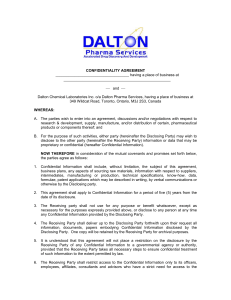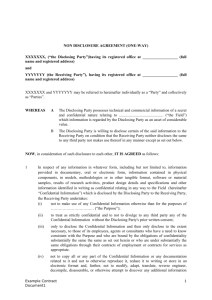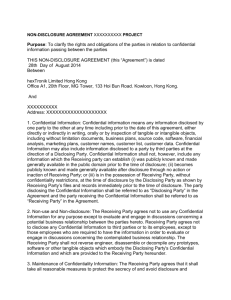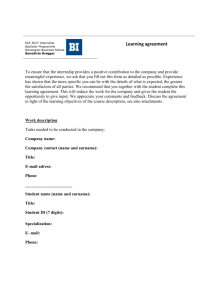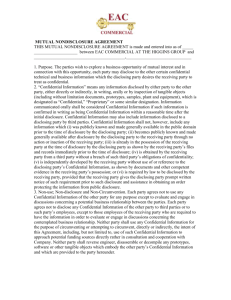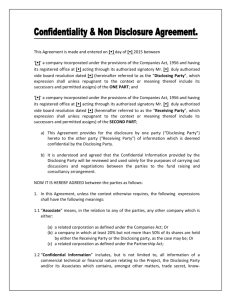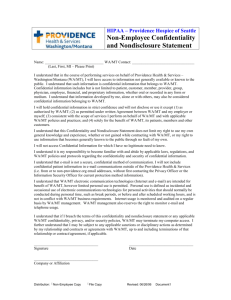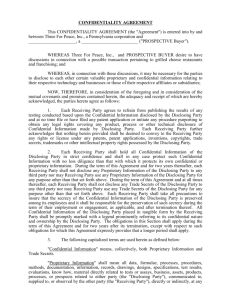Things to Consider When Entering into a Confidentiality Agreement
advertisement
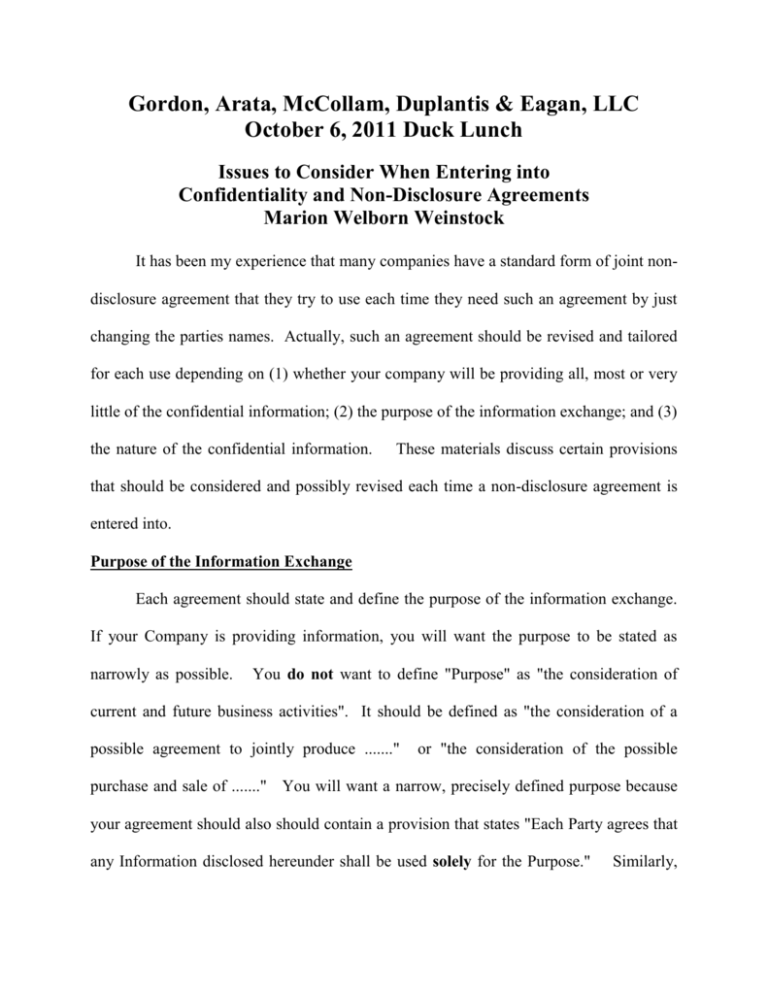
Gordon, Arata, McCollam, Duplantis & Eagan, LLC October 6, 2011 Duck Lunch Issues to Consider When Entering into Confidentiality and Non-Disclosure Agreements Marion Welborn Weinstock It has been my experience that many companies have a standard form of joint nondisclosure agreement that they try to use each time they need such an agreement by just changing the parties names. Actually, such an agreement should be revised and tailored for each use depending on (1) whether your company will be providing all, most or very little of the confidential information; (2) the purpose of the information exchange; and (3) the nature of the confidential information. These materials discuss certain provisions that should be considered and possibly revised each time a non-disclosure agreement is entered into. Purpose of the Information Exchange Each agreement should state and define the purpose of the information exchange. If your Company is providing information, you will want the purpose to be stated as narrowly as possible. You do not want to define "Purpose" as "the consideration of current and future business activities". It should be defined as "the consideration of a possible agreement to jointly produce ......." or "the consideration of the possible purchase and sale of ......." You will want a narrow, precisely defined purpose because your agreement should also should contain a provision that states "Each Party agrees that any Information disclosed hereunder shall be used solely for the Purpose." Similarly, the provision outlining which employees may be provided the information (to be discussed below) should be limited to those employees to whom "disclosure is necessary for the Purpose of this Agreement". Keep in mind, however, that if you do state a narrow, precise purpose, you will not be able to rely on that agreement down the road if you are providing information to the same party for a different purpose. In looking back to see if you can use a previously executed non-disclosure agreement with the same party, be sure to examine not only the term, but the definition of the purpose as well. Will the Information Need to be Marked "Confidential" to be Protected? The next issue to consider is whether you want to provide that the information disclosed has to be marked "confidential" in order to be protected. Some agreements define "Information" as "all information of a technical, commercial, manufacturing or business nature (including but not limited to samples, formula, procedures, technology, equipment configurations and test procedures) which is presented by Disclosing Party to Receiving Party in writing, other tangible forms or verbally" and then require the receiving party to keep all Information confidential, whether or not marked "confidential". Some agreements further define "Confidential Information" as "(i) written or other tangible Information that is marked “Confidential” or “Proprietary” (or similarly identified) at the time it is first delivered by the Disclosing Party to the Receiving Party and (ii) Information that is not in written or tangible form at the time of its initial disclosure hereunder but is identified as confidential by the Disclosing Party at the time of its initial disclosure to the Receiving Party" and then only protect Confidential Information. What you choose to do here will depend on the volume of the information 2 and its nature. Obviously it is better for you if you are receiving information to required that it be marked confidential. If you are disclosing information pursuant to an agreement that requires it be marked, you will need to put in place strict procedures for anyone in your company providing information to ensure they comply with this requirement. Non-Disclosure Provision and Employees to Whom Information May be Disclosed At a minimum, you will want to state in the non-disclosure provision certain general requirements on disclosure to employees. So for example, you could provide: "the Receiving Party shall keep Information received from the Disclosing Party hereunder strictly secret and confidential and shall refrain from disclosing it to parties other than its employees, who are acting in furtherance of this Agreement; provided, however, that Confidential Information will be disclosed to employees (i) only to the extent necessary for the Purpose of this Agreement; (ii) only if such employees have been informed of Receiving Party’s obligations under this Agreement and have a clear understanding of such obligations; and (iii) only if such employees are legally obligated to comply with this Agreement." Another option is to specifically identify by name the employees to whom the information may be disclosed and require them to sign onto the agreement. Duty of Care Typical language regarding the Receiving Party's duty of care is to provide that "The Receiving Party and its employees shall use not less than the same degree of care to avoid disclosure of Confidential Information as that which is used for its own 3 confidential information of like importance." This standard of care only works if the Receiving Party actually has standards in place for handling confidential information such as limiting access or other methods of preserving secrecy. If you have never dealth with the other party before or if they are a start up or unsophisticated party, you should investigate their practices regarding maintaining secrecy of their own information. If those practices are not existent or substandard, you should be sure to contain very specific provisions about the receiving party limiting access to the information and may want to clearly mark everything you disclose as confidential no matter how voluminous. Exclusions from the Confidentiality Requirement Typical exclusions from the obligation to keep the Information confidential are Information which: (a) the Receiving Party can demonstrate was known to it prior to disclosure by the Disclosing Party [as shown by written records existing prior to such disclosure]; or (b) is, or later becomes, public knowledge without breach of this Agreement by the Receiving Party ; or (c) is disclosed to the Receiving Party by a third person not in violation of any obligations of confidentiality to the Disclosing Party; or [(d) is developed by the Receiving Party independently from Information received from the Disclosing Party, as evidenced by appropriate documentation. The Receiving Party shall bear the burden of proving that its employees who developed the information have not had access to the Information.] 4 Depending on the nature of the information, you may or may not want to include the bracketed language in your exclusions. Term and Survival of Confidentiality Obligations It is important to remember here that there are two different time periods that need to be specified. Some non-disturbance agreements don't distinguish between these two periods which can lead to ambiguity and lawsuits. The first one can be referred to as the "disclosure period." It describes the time period during which disclosures are going to be made. It answers the question how long do we want this agreement to govern our respective obligations regarding disclosure? Or said another way, how long of a period are we going to be exchanging information for this purpose? This disclosure period could be stated as "This Agreement shall terminate on ____________" or "Either Party may terminate this Agreement by written notice to the other." The more important period is the second period which can be referred to as the "obligation of confidentiality" period. How long will the obligation to keep the information confidential survive after the termination of this agreement? This provision can be stated in the agreement as "Notwithstanding any such termination, the obligations of confidentiality herein shall survive for a period of _____ years from the date of termination of this agreement." The number of years that you choose to specify here must be long enough to protect the interests of the disclosing party, but not unduly burden the recipient. Ultimately, it is a judgment call on your part based on which party is providing more information and how sensitive the information is. In a situation where all (or almost all) of the confidential info is being disclosed by you, then the longer the 5 confidentiality obligation, probably the better. Where the information coming from you is extremely sensitive like trade secrets, formulas, etc., you may want to provide that the obligations of confidentially last forever. In such a case, you could provide "Notwithstanding the termination of this Agreement, the obligations of confidentiality shall survive indefinitely." (Of course from a practical perspective, once all of the information falls into one of the exceptions (ie. public knowledge without breach of the agreement, the obligation of confidentiality would not exist anymore)). In a situation where the information is coming only from the other side (or primarily from the other side and your information is not that sensitive), then a shorter period for the obligations of confidentiality is what you will want. Be careful of language that says "from the date hereof" such as at the end of "Notwithstanding any such termination, the obligations of confidentiality herein shall survive for a period of _________ years from the date hereof." Depending on the length of your term or particularly if you provide for termination by notice, this language could prove to be problematic. You could end up disclosing information after the period of confidentiality has already expires. It is easier and safer to use "from the date of termination" instead. Choice of Law You should try to select Louisiana or Texas (depending on where you are located) but if you cannot agree on that, at least try to get a neutral law such as Delaware. 6 Arbitration Provision if Dispute Involves Intellectual Property You may want to provide for arbitration for any dispute, but you should definitely consider including a provision such as this if intellectual property is being disclosed: "To the extent any dispute or claim which arises in connection with this Agreement involves intellectual property, such dispute will be finally settled by binding arbitration conducted before an independent patent attorney arbitrator residing in the United States who has been registered to practice before the United States Patent and Trademark Office for not less than 10 years. The decision by such arbitrator shall be subject to the Federal Arbitration Act, Title 9, Sections 1-16, inclusive." Notice So You Can Attempt to Get a Protective Order If you are the disclosing party, you will want to require prior notice in the event the other party becomes legally compelled to disclose the Information so you will have the opportunity to try to obtain a protective order. Such a provision would read: "In the event that Receiving Party or anyone to whom Receiving Party transmits Information pursuant to this Agreement becomes legally compelled (by oral questions, interrogatories, requests for information or documents, subpoena, civil investigative demand or similar process) to disclose any Information, Receiving Party shall provide the Disclosing Party with prompt written notice so that the Disclosing Party may seek a protective order or other appropriate remedy and/or waive compliance with the provisions of this Agreement. In the event that such protective order or other remedy is not obtained, or that the Disclosing Party waives compliance with the provisions of this Agreement, 7 Receiving Party or its representatives shall furnish only that portion of the Information which is legally required and shall exercise its best efforts to obtain reliable assurance that such Information shall be treated as confidential in accordance with the provisions of this Agreement." Provisions Concerning Injunctive Relief If you are the disclosing party, you will want a provision that says "The Parties agree that, in the event of breach or threatened unauthorized disclosure of Information, the Disclosing Party shall be entitled to an injunction prohibiting any such disclosure without proof of actual damages caused to the Disclosing Party by such breach or threatened breach and without posting of bond. For the purpose of the Disclosing Party’s obtaining equitable relief only, the Receiving Party acknowledges that the Confidential Information is unique and valuable and its disclosure will result in irreparable harm to the Disclosing Party." No Consequential Damages If you are the receiving party, you will want to limit potential damages for accidental or inadvertent disclosure. A provision to achieve this could read "IN NO EVENT SHALL EITHER PARTY BE LIABLE TO THE OTHER FOR CONSEQUENTIAL, INDIRECT OR PUNITIVE DAMAGES WHETHER BASED IN CONTRACT, TORT (INCLUDING NEGLIGENCE), STRICT LIABILITY OR OTHERWISE ARISING OUT OF A BREACH OF THIS AGREEMENT." 8 Disclaimer Regarding Information If you are the disclosing party, you may want to consider a disclaimer regarding the information being disclosed. Such a provision would read "Each Party represents and agrees that it is a sophisticated merchant, knowledgeable and experienced in the financial and business risks attendant to such Party’s business interests, shall not rely on any conclusions contained in, or discerned from, Information provided by the other Party and shall consider any possible transaction independently of the conclusions contained in any Information furnished hereunder and that (except as may be expressly provided otherwise in a separate, definitive written agreement that each Party may hereafter elect in its sole discretion to enter into) the other Party makes no representation or warranty regarding the accuracy, truthfulness or completeness of any Information provided by or through such other Party or its Representatives." Provisions to Clarify No License is Being Granted and Return of Information If you are the disclosing party, you may want to make sure your agreement includes a provision such as this "No implied license to the Information (or any technology comprising a part thereo) is granted hereby to the Receiving Party. All Information shall remain the exclusive property of the Disclosing Party. All Information disclosed shall be returned to Disclosing Party or destroyed promptly upon written request (and in any event no later than the end of the term of this Agreement) and shall not thereafter be retained in any form by Receiving Party." 9
